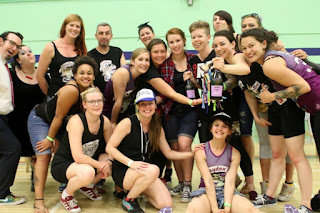My first post about roller derby is basically all about the skating. Getting your head around the equipment, learning to skate, watching games and meeting new people are all important parts of joining the derby community. It's about getting to know your team, learning the rules and setting your sights on passing minimum skills. It's a good idea when you're starting out to offer to NSO for your league. NSOs (Non Skating Officials) are crucial to the smooth running of games and scrimmages; tracking scores and penalties, keeping time and supporting the referees to keep things safe and fair. I can't stress enough how invaluable NSOing is to new skaters. You'll learn the rules faster, you'll see gameplay up close and develop an understanding of how and why penalties happen. You might not yet be at a skating level to be taking part in scrimmage, but I guarantee that when you are, an arsenal of knowledge gained from being part of the officials crew will come in handy.
 |
| [John Hesse] |
Let's talk about the skating. You've nailed the basics, you've passed your minimums and you're part of your team's rec league or B team. That's great! But it doesn't stop there. Roller Derby is tough, it's a physically demanding contact sport and the top skaters are in peak physical fitness. If you don't already take part in exercise outside of training, you'll probably want to start looking at upping your endurance through regular cardio, or HIIT, or both. You'll find that it's beneficial to have a strong core, you'll want to work on your leg strength too, as that's where your power comes from, so you might look at incorporating weight training into your routine too. Whether you're a gym bunny, a home workout queen or a fan of the outdoors, you'll probably start making time to work hard on your fitness to improve your game.
Then there's the tactics. Going to training each week will improve your skating skills, of course. You'll learn how you work within the team, you'll develop together and build on the basics of defence and offence, you'll work on good skating form, getting lower, improving foot work and agility, adding power to your hits. But there's more. This sport is evolving constantly, and the style of gameplay has changed so much in the last year alone. Learning something new is hard work. Particularly when you've been training for a while, you've worked on tactics with your team, you've played in games together and celebrated victories. Going back to training, trying something new and having to get it wrong a million times before you can get it right is frustrating. It's the only way to learn, but it's hard work. Week after week after week.
Finally, and possibly the most important, is the effort and commitment it takes to run a league. I mentioned before that you might start out by learning to NSO. After a little while, you might pick up some other roles within your league, joining a department to assist with things like creating posters for games, updating social media and looking after merch orders. A bit further down the line, you'll realise just how much hard work goes in to running a league. As this sport grows and teams develop it's clear that for many of us, roller derby has progressed far beyond a hobby and much more into the realms of a part time job. Albeit an unpaid one. My league recently registered as a limited company, and is defined as a not-for-profit organisation. This means we now have to file returns to HMRC, we have to submit accounts and comply with financial legislation. Coaches have to make time to plan sessions and keep the rest of the team in check when things don't always go right. The events team have to cover everything from securing contracts with venues, to ensuring there are enough people to help out on the day, to answering 8 million questions about where tables should be set up and why the poster in the cafe down the road keeps getting turned upside down. I don't even know half of what the directors go through, and to be perfectly honest, I'm not sure I want to. The words "there aren't enough hours in the day" have never seemed so apt. The amount of time, love and effort it takes to run a league is huge, and is a massive indication of how much the skaters, officials and league members are committed to this sport and everything it entails. It's hard work. Sometimes, when we're 2 hours into a league meeting and only half way through the agenda, I wish it would all run itself. But it doesn't, and do you know what, that doesn't matter. Why? Because hard work pays off.
 |
| https://www.gov.uk/file-an-annual-return-with-companies-house |
 |
| [Lianna Brinded] |
 |
| [Neil Biggs] |
The old saying "you get out what you put in" couldn't be more true. Being an integral part of a roller derby team requires you to put an awful lot in, but you get so, so much back, that, for me at least, it's worth all that hard work. Every time.
 |
| [Neil Biggs] |











